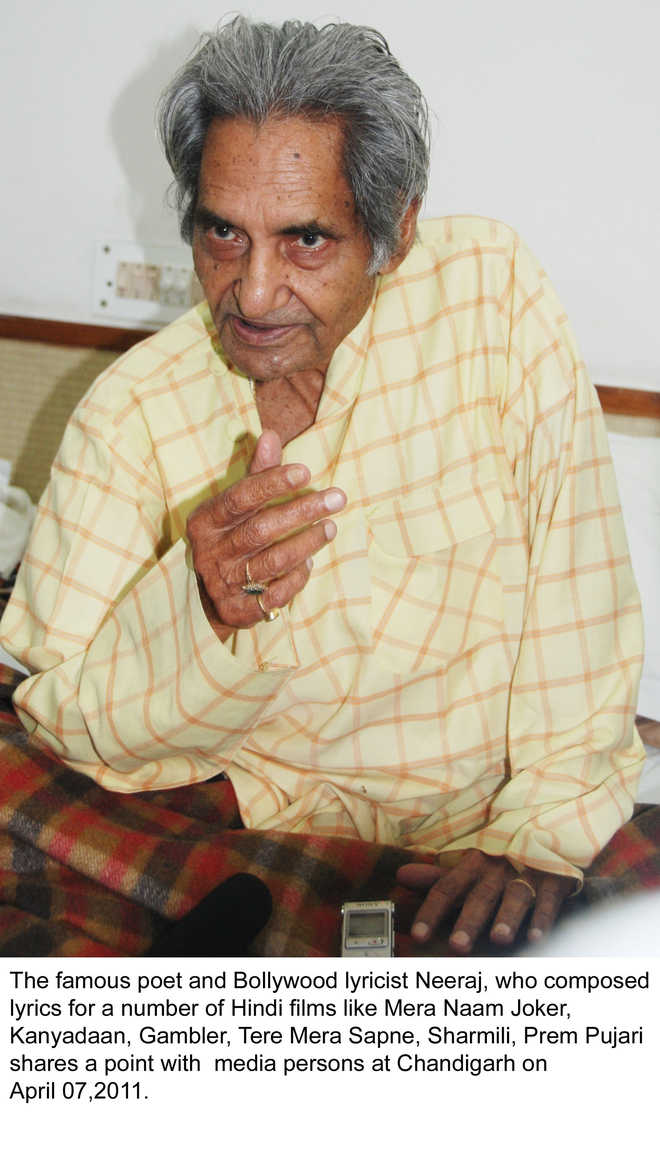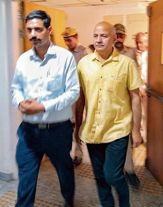
Irshad Kamil
Our City Beautiful was then a vast green expanse. Malls had yet not raised their humungous heads in the meadows of its beauty and Sector 17 was the only happening hub. There was one bus stand, which was also in Sector 17. From counter 18 or 19, buses for Manali would depart. Awaiting the arrival of one such bus, I happened to have my first fortuitous rendezvous with Gopal Das Saxena, a poet who wrote with the colour of flowers and pen of heart. He was better known as Neeraj.
We were a bunch of college boys, on our way to Manali for a youth leadership camp. We were waiting for the bus to arrive when one of my friends began to sing ‘Rangeela re’. The instant these words fell on my ears, I was smitten. Words resounding with musicality yet equally drenched in desire and pain... Predictably so, our group soon set out on the eternal time-pass game of antakshari. As for me, I stood spellbound by the words of Neeraj.
In the first verse of ‘Rangeela re’, the lyricist writes, ‘Kisi jal se na bujhe hai ye jalan’. ‘Jal se Jalan’? Why had the lyricist used the word jalan (jealousy) as the word agan (fire) carried better sense? Water is supposed to extinguish fire, not jealousy. His selection of words on the basis of sounds was the first thing that made me ponder about this lyricist, whom I didn’t know yet. I silently got up and went to a book stall to pick three song books. Rafi Ke Geet, Kishore Ke Geet and Mukesh Ke Geet.
It was in one of these books that I met Neeraj. Construing these books, I soon understood his insight into breaking a long composition into smaller parts and then weaving such magic through these that it would leave the listener awestruck. Sample this bit in ‘Rangeela Re’: ‘Kahin bhi jaye re, roye ya gaaye re, chain na paaye re’.
As our bus for Manali arrived, I hastily tucked the books into my shirt. I was sure that the company of these books would be much necessary on this long journey. We had just reached the outskirts of Chandigarh when the bus hit a speed breaker. A voice from the rear seat sang: ‘Ae bhai zara dekh ke chalo...’ Neeraj again!
I later came to know that in 1966, after the untimely demise of Shailender, the film industry had been hit by a dearth of lyricists who could write in pure Hindi. There were many great contemporary writers when Neeraj came on the scene. There were Sahir Ludhianvi, Majrooh Sultanpuri, Hasrat Jaipuri, Anand Bakshi, Rajinder Krishan, Gulzar, Yogesh and the likes. All of them had a unique personality and style. Sahir and Majrooh were inclined towards Urdu. Hasrat and Rajinder’s usage of words like ‘Zuby Zuby jalembu’ or ‘Bhai Bhatur’ would stun the listeners. Anand Bakshi added a dash of Punjabi language to the lyrics, which continues to be a thriving trend.
Yet, what the lyrics of Shailender contained, apart from the musical phonemes of Hindi, was the deep fragrance of the roots of India. After Shailender’s death, Raj Kapoor probably saw these qualities in Neeraj. He brought him on board for Mera Naam Joker. Neeraj mentioned in an interview that as he was aware that Raj Kapoor was making a film by the name of Mera Naam Joker, he had written the verse much before he was approached. What better thought or words could Raj Kapoor ask for the title song of Mera Naam Joker than: ‘Kehta hai joker sara zamaana, aadhi haqeeqat aadha fasaana’. In another song of this film, he had eloquently summed up life’s philosophy. This was : ‘Ae bhai zara dekh ke chalo’.
I was amazed at how beautifully he had brought the words of everyday usage into lyrics. Looking at his work, it is not surprising that it was yet again Neeraj who wrote ‘Paise Ki Pehchan’ about 50 years ago in Pehchan. The man was certainly ahead of his times.
Bombay of those years first beckoned this magician for a poetry recitation in 1960. Till then, while working as a typist in the supply department in the Capital, Neeraj had written numerous books. He was a big name in poetry circles. The then chief minister of Maharashtra, Y B Chavan, had such profound regard for his expression. On the eve of Neeraj’s birthday, Chavan held a poetry recital. What was notable was that nearly two hours were dedicated to Neeraj’s poetry alone. His words spun such magic that Chavan was at a loss for words and he offered him a cash reward of Rs 5,000.
After Neeraj’s recitation, film producer R. Chandra offered him a film as lyricist. In response to that offer, Neeraj humbly presented Chandra with a set of published books and said, ‘Owing to my job in Delhi, I cannot afford to shift to Bombay. If you like anything from what I’ve written in these books, please use it.’
If there was Sahir, whose poems in Talkhiyan were being adapted for film lyrics, there was Neeraj too, whose bygone words breathe indelible impressions of time, “Karwaan guzar gaya, gubaar dekhte rahe.”
There are timeless and countless metaphors and similes that he has bestowed upon the industry, like: ‘Dil aaj shayar’, ‘Dil ki qalam’, ‘Gham aaj naghma’, ‘Shab ye ghazal’, ‘Aansu ke dhaage’.
Love is never bound by time. What was loved in the past will undoubtedly be loved in the future. Neeraj will always be present in the metaphors, similes and way of expression in contemporary and future lyricists.



























